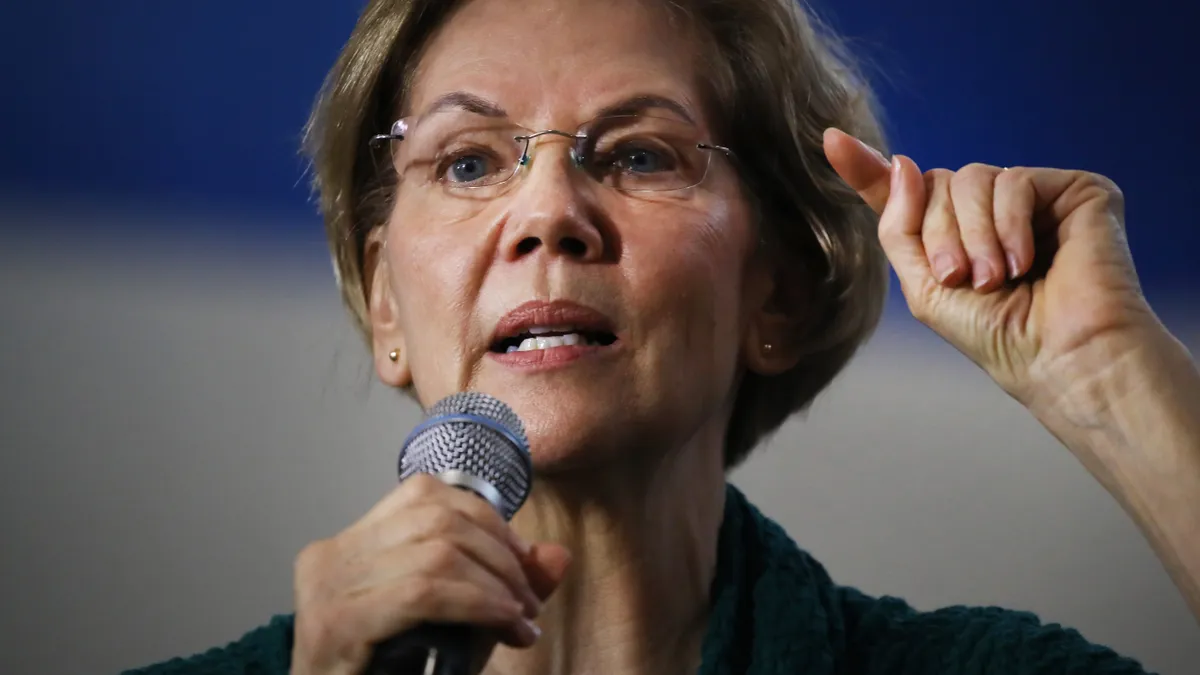Sen. Elizabeth Warren, D-MA, expressed concerns last week regarding the frequency and nature of Federal Reserve Chair Jerome Powell’s interactions with prominent bank executives and the potential influence these relationships may have on Fed policy decisions.
In a letter sent July 2, Warren slammed Powell for the perceived level of access he gives bank executives, highlighting his 19 private meetings with JPMorgan Chase CEO Jamie Dimon since February 2018; 10 with BlackRock CEO Larry Fink; and seven with Goldman Sachs CEO David Solomon.
Warren sought clarification on how the Fed ensures that its policy decisions remain impartial and in the best interests of the broader economy.
“Bank executives’ special access to you and other key Fed decision makers represents another troubling example of the culture of corruption that has taken root during your time leading the Fed,” Warren wrote.
In particular, Warren expressed concern that the private tete-a-tetes may affect the implementation of increased bank capital requirements, influence executive compensation structures and meddle with a proposed uptick in the scrutiny of potential bank mergers.
She brought to Powell’s attention a letter sent to him roughly two weeks earlier that noted Dimon’s efforts to target Powell as the “weak link” among the banking regulators on Basel III.
In the June 17 letter, Warren cited a May report from The Wall Street Journal that indicated Powell may be leaning toward halving the proposed capital requirements for the biggest U.S. banks. She highlighted that Dimon, at a meeting in Washington last fall, “told his fellow CEOs to bypass Michael Barr, the central bank’s vice chair for banking supervision” and “instead press other Fed governors,” primarily the Fed chair, to revise the capital requirements.
In her June letter, Warren asked Powell to allow the Fed’s board to convene for a vote on a 16% capital increase by the end of the month.
Powell, in March, told House lawmakers he expects “broad and material changes” to the capital requirements proposal the Fed issued in July 2023.
However, “[t]he Fed is now floating a gutted proposal,” Warren wrote July 2.
In last week’s letter, Warren noted the Fed’s refusal to join a multi-agency effort to put a cap on compensation for bank executives.
“The old rubric is putting our financial system at risk while lining wealthy executives’ and investors’ pockets,” she wrote.
Warren also flagged the $3 billion JPMorgan Chase made in last year’s acquisition of First Republic Bank — and an extra $1.5 million Dimon earned.
Warren asked what topics Powell discussed with Dimon during each of their 19 meetings; whether he discussed Basel III or made any commitments to Dimon or other big bank executives who would be subjected to it; and how much Powell’s interactions with the executives influenced his decision on updating the 1995 merger guidelines.
Warren cited recent data showing that political contributions from banks have increased 54% since May 2007, with JPMorgan spending roughly $15 million on lobbying since 2019 and approximately $4 million in 2023 itself.
Powell is expected to testify to the Senate Banking Committee on Tuesday and the House Financial Services Committee on Wednesday in semiannual monetary policy reports.
“We have received the letter and plan to respond,” the Fed said last week in a statement seen by Bloomberg.














